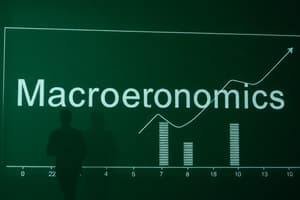Podcast
Questions and Answers
ما هي المشكلة التي نشأت من أجلها النظم الاقتصادية؟
ما هي المشكلة التي نشأت من أجلها النظم الاقتصادية؟
- مشكلة الازدهار
- مشكلة البطالة
- مشكلة التضخم
- مشكلة الندرة (correct)
كم عدد الأنظمة الاقتصادية المذكورة في المحتوى؟
كم عدد الأنظمة الاقتصادية المذكورة في المحتوى؟
- أربعة
- اثنان
- ثلاثة (correct)
- خمسة
أي من الأنظمة الاقتصادية يتضمن مبدأ العد؟
أي من الأنظمة الاقتصادية يتضمن مبدأ العد؟
- النظام التقليدي
- النظام الرأسمالي (correct)
- النظام الاشتراكي
- النظام المختلط
ما هو الهدف الرئيسي من إنشاء النظم الاقتصادية؟
ما هو الهدف الرئيسي من إنشاء النظم الاقتصادية؟
أيهما لا يعتبر نظامًا اقتصاديًا من الأنظمة المذكورة؟
أيهما لا يعتبر نظامًا اقتصاديًا من الأنظمة المذكورة؟
كيف يمكن تصنيف حاجات الإنسان من حيث طبيعتها؟
كيف يمكن تصنيف حاجات الإنسان من حيث طبيعتها؟
ما هو الوصف الأنسب لتطور حاجات الإنسان عبر الزمن؟
ما هو الوصف الأنسب لتطور حاجات الإنسان عبر الزمن؟
أي من الخيارات التالية يعكس مفهوم الحاجات الملحة للإنسان؟
أي من الخيارات التالية يعكس مفهوم الحاجات الملحة للإنسان؟
ما الذي يجعل حاجات الإنسان متزايدة؟
ما الذي يجعل حاجات الإنسان متزايدة؟
أي من الخيارات التالية تعتبر خاطئة بالنسبة لحاجات الإنسان؟
أي من الخيارات التالية تعتبر خاطئة بالنسبة لحاجات الإنسان؟
ما هي العوامل الرئيسية التي تحكم جهاز الثمن حسب المحتوى؟
ما هي العوامل الرئيسية التي تحكم جهاز الثمن حسب المحتوى؟
في أي الحالات يحق التدخل في نظام الثمن؟
في أي الحالات يحق التدخل في نظام الثمن؟
ما هو الهدف من التدخل في نظام السوق؟
ما هو الهدف من التدخل في نظام السوق؟
ما هو العيب الرئيسي في نظام الثمن الكامل؟
ما هو العيب الرئيسي في نظام الثمن الكامل؟
أي مما يلي يعتبر فعلاً مسموحاً به في نظام الثمن؟
أي مما يلي يعتبر فعلاً مسموحاً به في نظام الثمن؟
ما المقصود بالحرية الاقتصادية؟
ما المقصود بالحرية الاقتصادية؟
أي من الخيارات التالية يتوافق مع مفهوم الحرية الاقتصادية؟
أي من الخيارات التالية يتوافق مع مفهوم الحرية الاقتصادية؟
أي من الجوانب التالية لا ترتبط مباشرة بالحرية الاقتصادية؟
أي من الجوانب التالية لا ترتبط مباشرة بالحرية الاقتصادية؟
ما هي الشروط الرئيسية لتحقيق الحرية الاقتصادية؟
ما هي الشروط الرئيسية لتحقيق الحرية الاقتصادية؟
ما الذي لا يجب أن يتعارض مع الحرية الاقتصادية؟
ما الذي لا يجب أن يتعارض مع الحرية الاقتصادية؟
لماذا يتخذ منحنى الإنتاج الشكل المقعر؟
لماذا يتخذ منحنى الإنتاج الشكل المقعر؟
كيف تؤثر تكاليف الإنتاج على قرارات المنتجين؟
كيف تؤثر تكاليف الإنتاج على قرارات المنتجين؟
ما هو تأثير الانتقال من إنتاج سلعة ما إلى خدمة أخرى؟
ما هو تأثير الانتقال من إنتاج سلعة ما إلى خدمة أخرى؟
ما الذي يفسر عدم قدرة المنتجين على الحفاظ على كفاءة الإنتاج عند تغيير المنتجات؟
ما الذي يفسر عدم قدرة المنتجين على الحفاظ على كفاءة الإنتاج عند تغيير المنتجات؟
ما هو أهم سبب يؤدي إلى تزايد التكاليف عند إنتاج سلع جديدة؟
ما هو أهم سبب يؤدي إلى تزايد التكاليف عند إنتاج سلع جديدة؟
كيف يمكن وصف مسألة الندرة بالنسبة للموارد؟
كيف يمكن وصف مسألة الندرة بالنسبة للموارد؟
ما هي الميزة المحتملة لتعدد الموارد؟
ما هي الميزة المحتملة لتعدد الموارد؟
ما الذي يجب على الأفراد فعله في مواجهة مشكلة الندرة؟
ما الذي يجب على الأفراد فعله في مواجهة مشكلة الندرة؟
تعتبر مشكلة الندرة نتيجة لل:
تعتبر مشكلة الندرة نتيجة لل:
ما الذي يشير إليه مفهوم الموارد الحرة في سياق الندرة؟
ما الذي يشير إليه مفهوم الموارد الحرة في سياق الندرة؟
Flashcards
حاجات الإنسان
حاجات الإنسان
احتياجات البشر الأساسية، التي تتضمن الطعام والشراب والملبس.
متجددة
متجددة
تتغير باستمرار مع الزمن.
ملحة
ملحة
ضرورية ولا يمكن الاستغناء عنها.
متزايدة
متزايدة
Signup and view all the flashcards
تطور الحاجات
تطور الحاجات
Signup and view all the flashcards
منحنى الإنتاج المقعر
منحنى الإنتاج المقعر
Signup and view all the flashcards
قانون تزايد النفقات
قانون تزايد النفقات
Signup and view all the flashcards
النظم الاقتصادية
النظم الاقتصادية
Signup and view all the flashcards
مشكلة الندرة
مشكلة الندرة
Signup and view all the flashcards
النظام الرأسمالي
النظام الرأسمالي
Signup and view all the flashcards
عدد الأنظمة الاقتصادية
عدد الأنظمة الاقتصادية
Signup and view all the flashcards
سعر السوق
سعر السوق
Signup and view all the flashcards
التدخل الحكومي
التدخل الحكومي
Signup and view all the flashcards
الحرية الاقتصادية
الحرية الاقتصادية
Signup and view all the flashcards
التملك
التملك
Signup and view all the flashcards
الاستثمار
الاستثمار
Signup and view all the flashcards
الإستهالك
الإستهالك
Signup and view all the flashcards
الضرر بالعامة
الضرر بالعامة
Signup and view all the flashcards
مخالفة الشريعة
مخالفة الشريعة
Signup and view all the flashcards
ندرة الموارد
ندرة الموارد
Signup and view all the flashcards
اختيار الموارد
اختيار الموارد
Signup and view all the flashcards
الموارد الحرة
الموارد الحرة
Signup and view all the flashcards
الموارد النادرة
الموارد النادرة
Signup and view all the flashcards
مشكلة الندرة النسبية
مشكلة الندرة النسبية
Signup and view all the flashcards
Study Notes
Economic Principles Summary
- Economics Origin: The origin of economics is not tied to a specific time, with contributions across history.
- Modern Economics' Origin: Adam Smith (1776) and his work "The Wealth of Nations" are often cited as the beginning of modern economics, although others argue for Ibn Khaldun as the founder.
- "Oikos" and "Nomos": The word "economics" stems from the Greek words "Oikos" (house) and "Nomos" (law/management), meaning "rules of the household."
- Arabic Root: The Arabic root is "Qasd," meaning "straight path," or "direction."
- Political Economy: Initially, "political economy" combined economics and politics, examining social and political factors impacting the economy.
- Pure Economics: Later, "pure economics," emerged as a separate study, focusing on economic factors independent of politics.
Economic Branches
- Microeconomics: Studies individual economic units (like a single product).
- Macroeconomics: Studies the entire economy and larger trends.
Economic Methods
- Deduction: Uses logical reasoning from established principles to derive specific conclusions (e.g., analyzing the price of a product).
- Induction: Uses practical data and observations to arrive at general principles.
Economic Analysis Tools
- Economic Theory: Creates hypothetical situations (like a given country's economy facing a specific crisis), then analyzes how that impacts the economy.
- Economic History: Examines past economic events and mistakes, drawing lessons from historical precedents.
- Statistics: Collects and analyzes data rigorously, providing quantitative evidence (e.g., researching consumer demand). However, potential for error exists in statistical data.
Types of Economic Analysis
- Normative: Explains "what ought to be" based on opinions and values.
- Positive: Describes "what is" using facts and data. It answers: "how," "for whom," and "what" is produced.
Nature of Economics
- Social: Economics is connected to social interactions.
- Environmental: Focuses on resource management and conservation.
- Political: Explores the impact of government policies.
- Behavioral: Studies how individual and group behavior affect economic phenomena.
- Mathematical and Statistical: Utilizes mathematical and statistical tools for analysis.
- Ethical: Emphasizes fairness, honesty, and societal well-being.
The Economic Problem
- Scarcity: Limited resources and unlimited wants present a fundamental economic challenge.
- Factors of Production: Human resources, natural resources, and capital goods, which contribute to production.
- Land / Natural Resources: Provides raw materials, and the proportion of that an individual gets depends on their contribution.
- Labor / Human Resources: The human input in manufacturing, determining pay for workers.
- Capital (Physical Capital): Tools, machinery, assets-related profits earned from ownership.
- Organization (Entrepreneurship): Organizing the above factors to manage resources, workers, assets- for potential profit.
- Opportunity Cost: The value of the next-best alternative given up when making a choice.
Needs and Wants
- Needs (essential): Basic requirements for survival.
- Wants (non-essential): Desires not essential for survival.
Production Possibility Curve (PPC)
- PPC: A graphical representation of the possible combinations of goods and services an economy can produce given its resources and technology.
- Shape: The PPC typically curves outward, illustrating the increasing opportunity costs of producing more of one good relative to another.
- Full Employment: Points on the PPC represent full utilization of resources.
- Underemployment: Points inside the PPC indicate unused resources.
Types of Economic Systems
- Capitalism:
- Characteristics: Individual economic responsibility, private property, profit motivation, competition, and price control through supply and demand.
- Drawbacks: Inequality, economic crises, environmental issues, and ethical compromises.
- Socialism:
- Characteristics: Collective/public ownership, central planning, and social needs as a priority.
- Drawbacks: Bureaucracy, limited individual incentives, and difficulties in managing the economy effectively.
- Islamist Economy:
- Characteristics: Embraces Islamic principles, combining private and public ownership, emphasizing justice and welfare.
- Principles: Khalifa (stewardship), halal/haram, community welfare, and moderation..
Market Types
- Perfect Competition:
- Characteristics: Many buyers and sellers, identical products, easy entry/exit, perfect information.
- Monopoly:
- Characteristics: Single seller, no close substitutes, barriers to entry, price control.
- Monopolistic Competition:
- Characteristics: Many sellers, differentiated products (e.g., branding), relatively easy entry/exit.
- Oligopoly:
- Characteristics: A few large sellers, considerable interdependence and price control.
Studying That Suits You
Use AI to generate personalized quizzes and flashcards to suit your learning preferences.




